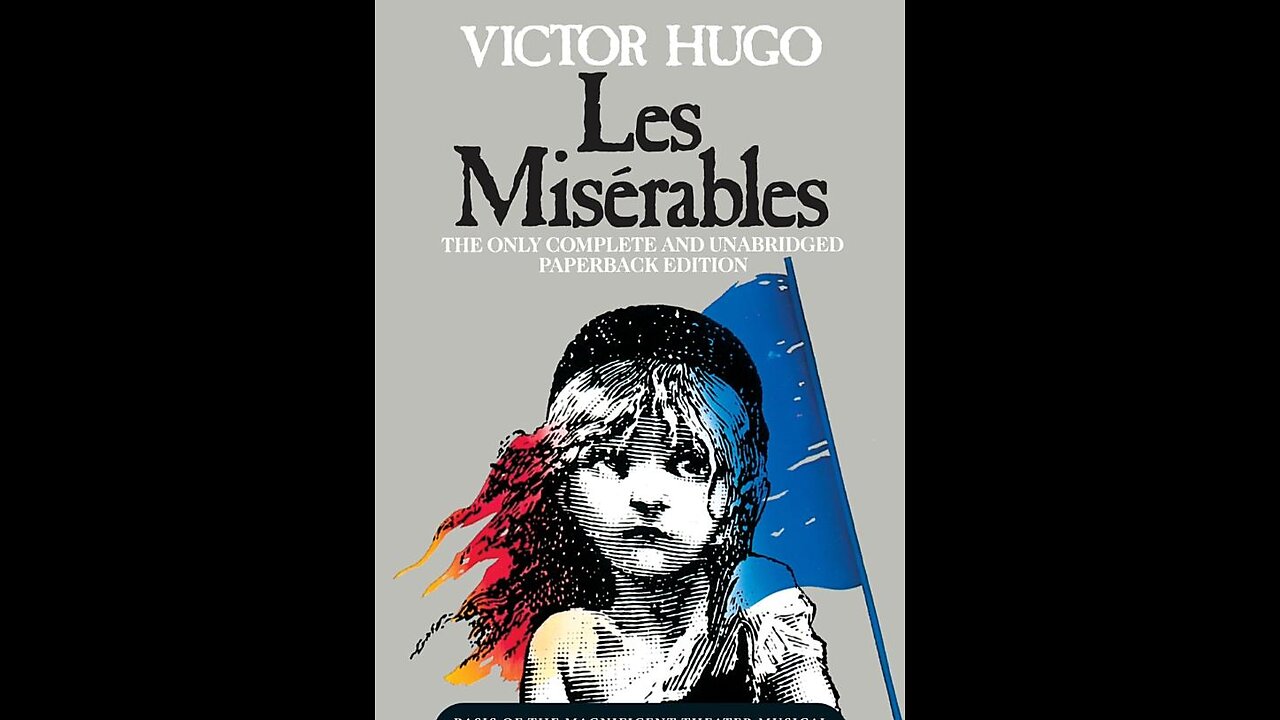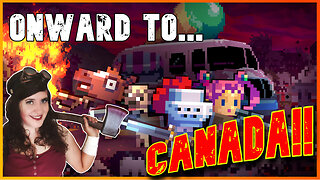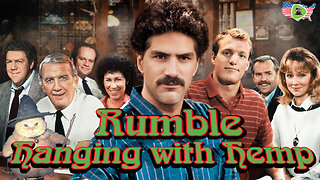Premium Only Content

Les Misérables, The Vatican's powerful display of another Gospel, Another Jesus
Blog and associated study links for this video
https://www.thethirdheaventraveler.com/2023/03/no-wonder-its-one-of-most-beloved.html
The Catholic writer Theresa Malcolm says that after Valjean leaves, "Monseigneur Myriel never again appears in the story, but he is the soul of the novel, he who sowed love where there was hatred, light where there was darkness."[14]
Adaptations[edit]
Main article: Adaptations of Les Misérables
The Gospel Message is NOT in Les Misérables is NOT a lesson in the GOSPEL of GRACE, But rather another Gospel, another Jesus.
In the end we are introduced to the spirit of the antichrist which explains the overwhelming popularity of this novel since 1862 and one of the greatest Broadway plays in history.
It’s no wonder it’s one of the most beloved scores in musical theatre history, with breakout hits aplenty.
London Theater Critique UK
1 John 4:3
“And every spirit that confesseth not that Jesus Christ is come in the flesh is not of God: and this is that spirit of antichrist, whereof ye have heard that it should come; and even now already is it in the world.”
King James Version (KJV)
2 Corinthians 11:4
“For if he that cometh preacheth another Jesus, whom we have not preached, or if ye receive another spirit, which ye have not received, or another gospel, which ye have not accepted, ye might well bear with him.”
King James Version (KJV)
I was surprised to see a few YouTube Videos claiming Les Misérables as the GOSPEL message like this one here: Note: I have seen the play three times and although acknowledge the powerful Bishop's scene, I had no idea of the centerpiece the Bishop played throughout Victor Hugo's Novel.
The Gospel message in Les Misérables : The priest's song
The first priest's song to Jean Valjean is symbolic of the invitation of Christ through the church to a weary world: "Come in, Sir, for you are weary, And the night is cold out there. Though our lives are very humble What we have, we have to share. There is wine here to revive you. There is bread to make you strong, There's a bed to rest till morning, Rest from pain, and rest from wrong" (Bread and wine speak of communion/the eucharist) The second priest's song to Jean Valjean is symbolic of the grace of God: after Valjean paid the priest evil for good,stole from him and ran away,when he got caught, the priest covered him, protected him from the officers who arrested him, and even sent him away with a gift: "But my friend you left so early Surely something slipped your mind You forgot I gave these also Would you leave the best behind?" The priest asked the officers to release him: "So, Messieurs, you may release him For this man has spoken true I commend you for your duty And God's blessing go with you." Then he turned to Valjean: "But remember this, my brother See in this some higher plan You must use this precious silver To become an honest man
By the witness of the martyrs By the Passion and the Blood God has raised you out of darkness
I have bought your soul for God!"
Matthew 26:15
“And said unto them, What will ye give me, and I will deliver him unto you? And they covenanted with him for thirty pieces of silver.”
King James Version (KJV)
This grace touched Valjean's heart,transformed his life, and he in turn, touched the lives of others around him....
COMMENTS TO THE VIDEO
1:25 - Do the roar.
(note: I'm researching this further, see the roar thinking of LION Roaring scripture:
1 Peter 5:8
King James Version
8 Be sober, be vigilant; because your adversary the devil, as a roaring lion, walketh about, seeking whom he may devour:
Beautiful and piercing to say the least. Such compassion. Represennts God's attitude towards mankind when mankind is willing to come out of denial.
The main premise to this musical can be summed up as Grace vs Law just the fact this dude popped up with bread and wine makes him Melkeidech, he is literally Jesus popping up in Val Jean's life... bro.. The grace and mercyh he got after stealing his silver. wow. This is making me cry it's so beatuiful. And that colm plays the priest in the movie is so good hes' like bro I walked ur exact road.
he reference for the wine to revive, and the bread to make you strong is a reference to communion.
The candle stand if placed on a table can only give light to a room. However, Valjean made it to shine the world. God’s blessing and miracle.
Was the priest supposed to look like Jesus or was that a clever coincidence?
When he originally began writing the novel, Hugo was going to write about a Saint, the Bishop. In the end the novel featured three saints, the Bishop, Valjean, and the Mother Superior of a convent where Valjean hides after escaping Javert who famously never told a lie in her entire life, except once to save Valjean.
Additional Quotes from Les Misérables and the Gospel message from YouTube
Comments:
One said,: “This is Jesus.”
The Gospel here before us. Etc.
Few more examples:
The gospel before us. The monk is like a figure of Jesus and Valjean each and one of us. New man=being born again, the silver= the Cross, fear and hatred =life before Jesus and after all that now he belongs to God.
What a great example of awe inspiring Christian grace. I'm not even Christian but stuff like this scene really show the appeal of the faith. And Liam Neeson's acting is superb here. Comparing the look of hesitant, shameful anger and desperation in his face when he hits the Bishop, to the look of trembling awe at the end.....breathtaking
Ladies and Gentlemen, this is what a real Bishop should act like - caring about the man over the materials.
In my opinion, this is the most powerful chapter chapter / scene in all of literature / film. It perfectly portrays the type of person that many of us are in some respects (Valjean before his transformation by the Bishop's pure love and charity) and the type of person that we should strive to become (the Bishop). I believe that Victor Hugo was inspired of God as he wrote this.
This makes me cry every single time
Even though I'm not christian and not religious at all but still I want to live like this bishop
He sees people's goodness deep inside their hearts and save people by forgiving their mistakes
Notice how the Gendarme represent justice, the bishop represents Christ, and Jean Val Jean represents all of us.
Notice how the Bishop does not hate justice (the gendarme) he offers them wine. Yet because of Christ's sacrifice for us (represented by the pieces of silver), He can show Jean mercy. Justice does not rob mercy, and mercy does not rob justice because of Christ's sacrifice for all of us in the garden and on the cross.
Things like this make me remember why I'm Catholic.
End Quotes Comments.
Additional links explain the profound impact of Les Misérables
Learning from ‘Les Mis’ | Graduate School of Arts and Sciences (harvard.edu)
NOW FOR THE TRUTH
It deeply saddens me to see how deceived people are. What is happening in the Bishop scene is the Bishop is in essence replacing Christ with himself and ultimately the office of the Pope as the Vicar of Christ. If you don't see this, then please pray that the Lord open your eyes. It's craft and deception of the Bishop seemingly bringing the GOSPEL to this wretched soul Jean Valjean, but in reality, he talks about the crucifixion and the blood as witnessed by the martyrs, but it is ONLY JESUS CHRIST and him alone who ransoms the SOUL by BELIEF that Jesus Christ died on the cross for our sins according to the scriptures, He was buried, and He rose again the third day according to the scriptures.. It is only by GRACE through FAITH alone.
See Most DO NOT KNOW THE GOSPEL
Most do NOT know the GOSPEL #EndTimes (thethirdheaventraveler.com)
I've watched the theatrical version of Victor Hugo's Les Misérables three times from Broadway, Washington DC and beyond during my years in the wilderness. It has only been recently as a mature Christian have I come back to study this work and expose the spirit of the antichrist which is so prevalent in Victor Hugo's work.
Disclaimer: I'm not promoting that Christians should never go to the theater. Nor do I think I was in sin when I attended. This is religion and not experiencing freedom in Christ. If going to the theater offends someone they should not go or push someone else to go. Please see Colossians 2:16 and 1 Corinthians 6:12 KJB.
I'm only bringing this up to express how my eyes have been opened to what is truly behind this play and novel.
Victor Hugo 1802-1885 assumed Hugo was a devout Catholic from his strict devotion to the Catholic faith in his underlying obsession and reverence to Bishop Charles-François-Bienvenu Myriel, referred to as Bishop Myriel or Monseigneur Bienvenu of Digne.
Of course, he was raised and educated by a devout Catholic mother, so he did have "the indoctrination." However, as he grew older his disdain for the Catholic Church grew stronger as witnessed by the backdrop of the French Revolution 1789 into the July Revolution of 1830 which I discuss below as LIBERTY and God's judgment in notes below.
However, it is very interesting to note that although Hugo was waning from the Catholic church and his son was strongly anti-religious, Hugo insisted he stay with the true spirit of the times to show what a "true cleric catholic priest should look like" which again proves Hugo's upbringing and adherence to the catholic faith. See this quote:
"As Hugo set to work on the novel in 1848 after a long interruption, his anti-clerical son Charles objected to presenting Myriel as "a prototype of perfection and intelligence", suggesting instead someone from "a liberal, modern profession, like a doctor". The novelist replied:
I cannot put the future into the past. My novel takes place in 1815. For the rest, this Catholic priest, this pure and lofty figure of true priesthood, offers the most savage satire on the priesthood today.[3]"
Historical Background to 'Les Miserables' (liveabout.com)
Les Misérables - Wikipedia
Hugo's religion (all men adhere to a religion because all men are created with a spirit and soul within their body) was Freemasonry. His Luciferian enlightenment of man took over in his writings.
See quotes which reveal a great deal: Note: His membership as a freemason was self-admittedly hidden for political reasons.
Victor Hugo’ Famous Freemasons - Issuu
Hugo’s writings contain numerous references to Freemasonry and its philosophies. “God manifests himself to us in the first degree through the life of the universe, and in the second degree through the thought of man. The second manifestation is not less holy than the first. The first is named Nature, the second is named Art,” wrote Hugo.
Victor Hugo, conceived as an immense depiction of the history and evolution of humanity – from darkness into Light.
Hugo’s characters aspire towards the ideal of perfection, a seemingly impossible dream is given wings through his masterful writings. Jean Valjean’s fortitude against almost insurmountable odds, Javert’s justice, or Cosette’s enduring faith, each is an example of a Masonic virtue personified. Soldiers of the revolution, Hugo’s characters march diligently towards that glorious victory –overthrowing tyrants, trampling evil, developing virtues, and discarding vice. These legendary stories populate example of a Masonic virtue personified. Soldiers of the revolution, Hugo’s characters march diligently towards that glorious victory –overthrowing tyrants, trampling evil, developing virtues, and discarding vice. These legendary stories populated with archetypal figures are Hugo’s immortal gift to humanity, providing examples of divine virtues for mankind’s enrichment and emulation.
French Revolution 1789 into the July Revolution of 1830 which I discuss below as LIBERTY and God's judgment.
The Dragonnades of the Vatican pawn King of France Louis XIV; Why the French Revolution- Liberty - was God's Divine Judgment
The slaughter and extreme persecution didn't end with the Waldensians.
History of the Waldenses
The History of the Waldenses: Wylie, J. A.: 9781519095176: Amazon.com: Books
I was shocked to find the Vatican Jesuit army was panicking to see Protestant s thriving and growing in France under the Huguenots.
They went on another slaughter fest in France.
After driving out the Protestants France then turned on itself and the Catholic Church.
In the unbridled blood must of the French Revolution under LIBERTY.
The literal overthrow of Government and Church.
And the USA adapted the same spirit making any all religion accepted under the Mob rule of government... then said oh no, we don't trust the people, so we'll make it a representative democracy under a republic. A different story for a different day.
See full studies and research for yourself the ILLUMANTI and the founding Fathers, Masonry, Lady Liberty, The Statue of Liberty.
Roman goddess LIBERTAS
The Secret Worship of the Illuminati: The Statue of Liberty is Anunnaki Goddess Inanna - Stillness in the Storm
Founding Fathers, Secret Societies - Google Books
An exploration of the influence of secret societies on the formative documents and symbols of the United States
• Reveals the Founding Fathers’ spiritual vision for America as encoded in the Great Seal
• Traces the influence of the Iroquois League of Nations upon the Constitution
• Exposes the deep connections the Founding Fathers had with the Freemasons and other secret societies
All children growing up in America learn who the Founding Fathers were. Most, however, never learn of the founders’ connections to the Freemasons, the Rosicrucians, and other esoteric orders. In Founding Fathers, Secret Societies Robert Hieronimus investigates these important connections and how their influence can be traced throughout our most significant national documents and ...
But the French Revolution was God's Judgment on France. No doubt after their incessant persecution of the Protestants.
France was so proud of itself for cleaning out the filthy Protestants. The Jesuits thought the Waldensians slaughter would clean them out permanently, but they kept growing in France.
THE BEER GOD - LIBERTY - LIBER FREEDOM
Amazing Study by Practical Christian
More depictions of I give your Soul Back to God
NOTES
Bishop Charles-François-Bienvenu Myriel, referred to as Bishop Myriel or Monseigneur Bienvenu, is a fictional character in Victor Hugo's 1862 novel Les Misérables.[1] Myriel is the Bishop of Digne in southeastern France.
The actual Bishop of Digne during the time in which Myriel's appearance in the novel is set was Bienvenu de Miollis (1753–1843) who served as Hugo's model for Myriel.[2] In the novel and the film and musical adaptions of it, the Bishop is a heroic figure who personifies compassion and mercy.
As Hugo set to work on the novel in 1848 after a long interruption, his anti-clerical son Charles objected to presenting Myriel as "a prototype of perfection and intelligence", suggesting instead someone from "a liberal, modern profession, like a doctor". The novelist replied:
I cannot put the future into the past. My novel takes place in 1815. For the rest, this Catholic priest, this pure and lofty figure of true priesthood, offers the most savage satire on the priesthood today.[3]
Bishop Myriel in the novel[edit]
The novel’s first fourteen chapters are an account of the life and practices of Myriel. He was born into a noble family: "the whole of the first portion of his life had been devoted to the world and to gallantry."[4] His wife died while they were living in Italy as exiles from the French Revolution. The narrator reports his next transformation with a rhetorical question:[5]
Was he, in the midst of these distractions, these affections which absorbed his life, suddenly smitten with one of those mysterious and terrible blows which sometimes overwhelm, by striking to his heart, a man whom public catastrophes would not shake, by striking at his existence and his fortune? No one could have told: all that was known was, that when he returned from Italy he was a priest.
While a little-known priest, he had a chance encounter with Napoleon and praised him, as a result of which he was made a bishop. He continues to act like a common, compassionate, country priest, generally known by the name "Monseigneur Bienvenu" ("welcome"). He moved into the small town hospital, so that the episcopal palace could be used as a hospital and keeps only a tenth of his salary for himself, spending the rest on alms. He once accompanied a condemned man to the scaffold, after the village priest refused to do so. Hugo devotes one chapter to a transformative episode for Myriel, in which the Bishop visits an old revolutionary on his deathbed. They discuss the politics and morality of revolution, and Myriel comes to marvel at his "spiritual radicalism", asking his blessing as he dies.[6]
The narrator summarizes Myriel's philosophy:[7]
There are men who toil at extracting gold; he toiled at the extraction of pity. Universal misery was his mine. The sadness which reigned everywhere was but an excuse for unfailing kindness. Love each other; he declared this to be complete, desired nothing further, and that was the whole of his doctrine.
One night Jean Valjean shows up at his door, asking a place to stay the night. Bienvenu graciously accepts him, feeds him, and gives him a bed. Valjean takes most of Bienvenu's silver and runs off in the night. The police capture Valjean and take him back to face Bienvenu. The police inform Bienvenu they have found the silver in Valjean's knapsack, and Bienvenu tells the police that he had given them to Valjean as a gift so they will not arrest him again. Valjean is surprised of Bienvenu's graciousness, and later sees the error in his ways. He chastises Valjean for not taking the silver candlesticks as well. After the police leave, Bienvenu tells Valjean to use the silver to become an honest man.
Myriel is referenced several times later in the novel. In 1821, Valjean, while serving as a mayor under the name Monsieur Madeleine, learns from a local newspaper of Myriel's death at 82, and wears mourning attire for some time. [8] Not long after, as Valjean contemplates allowing Champmathieu to be convicted in his stead, a "terrible voice" tells him: "Destroy these candlesticks! Annihilate this souvenir! Forget the Bishop! Forget everything! Destroy this Champmathieu, do! ... Yes, it is well arranged thus. Ah, wretch!" The voice then warns that one person, presumably Champmathieu, will curse him if he follows that advice. The voice is not identified, but the passage implies that it is the recently deceased Myriel as it concludes with Valjean asking who is there:[9]
There was some one; but the person who was there was of those whom the human eye cannot see. He [Valjean] placed the candlesticks on the chimney-piece.
Just before Valjean's death, when a female porter asks if he wants a priest, he replies "I have one," and points upward. The narrator adds: "It is probable that the Bishop was indeed a witness of this death-agony."[10] The silver candlesticks, Myriel's gift to Valjean, are mentioned several times near the novel's end, and Valjean dies in the glow of their candles.[11]
Role and significance[edit]
Writing in The Contemporary Review in 1885, Margaret Oliphant welcomed Hugo's portrait of Myriel as a refreshing change from his depiction of religious life in The Hunchback of Notre Dame, a "surprise of sweetness and relief". Calling Myriel "the keynote of the wonderful tale", she considered all the adventures of Valjean and Javert "on a much lower level of art than the opening". She continued:[12]
All the after-struggle is secondary to the great event of the beginning, which is the salvation of Jean Valjean, not from the law or the prejudices of society, but from the power of evil. Javert is an accident, though a striking one; the real matter is much higher; it is the work of Bishop Myriel, not of the penal code. It is the redemption of a soul; it is the struggle, first of the dominating sin with the dim risings of a better life [...]
Kathryn M. Grossman describes Myriel's work in transforming the lives of the poor as a moral "investment". His "fraternal demeanor thus corresponds to an economy marketing in souls." She continues:[13]
By his theft, Jean Valjean shows that he is still chained to hatred and anger; by his generosity, Myriel operates a spiritual purchase (achète) that substitutes "goodwill, gentleness, and peace"—in other words, "God"—for this satanic mentality. While Christ alone can redeem (rachète) with the sacrifice of his life, his bishop can perform an equally effective exchange. In divesting himself of his silver, Myriel invests in Valjean. All he demands of the recipient is that he prove worthy of the promise that he could not have made in his prison of sin, but that he will have made following his liberation. Sublime fiction opens the way, as in Simplice's case, to a higher truth.
The Catholic writer Theresa Malcolm says that after Valjean leaves, "Monseigneur Myriel never again appears in the story, but he is the soul of the novel, he who sowed love where there was hatred, light where there was darkness."[14]
Adaptations[edit]
Main article: Adaptations of Les Misérables
Since the original publication of Les Misérables in 1862, the character of Bishop Myriel has been in a large number of adaptations in numerous types of media based on the novel, such as books, films,[15] musicals, plays and games.
Bret Harte parodied Les Misérables in his Condensed Novels. In this version, Myriel confesses to stealing his own candlesticks. When the police can take no action against him, "He had a charming ball and chain made, affixed to his leg, and wore it the rest of his life."[16]
Bishop Myriel in the musical[edit]
See also: Synopsis of the musical and Les Misérables (musical) § Synopsis
-
 29:08
29:08
The Lou Holtz Show
14 hours agoThe Lou Holtz Show Ep 21 | Enes Kanter Freedom: A Voice For Human Rights #podcast
63.4K3 -
 28:31
28:31
America First Policy Institute
21 hours agoAmerica First Policy Institute Gala Donald Trump, Elon Musk & Sylvester Stallone Ignite the Movement
29.1K18 -
 4:36
4:36
BIG NEM
12 hours agoThe Sad Truth About How Our Cannabis is Grown
36.2K15 -
 3:07:08
3:07:08
Price of Reason
16 hours agoMainstream Media FEARS Extinction! Gladiator 2 Review! New DnD SCANDAL!
62K10 -
 8:23:44
8:23:44
Fresh and Fit
13 hours agoIsrael-Hezbollah Ceasefire & Reacting To Death Threats On X
161K41 -
 1:11:10
1:11:10
Steve-O's Wild Ride! Podcast
5 days ago $10.31 earnedDusty Slay Went From Selling Pesticides To Having A Netflix Special - Wild Ride #244
57.4K3 -
 1:16:02
1:16:02
CocktailsConsoles
11 hours agoBE PART OF THE GAME!!| Death Road to Canada | Cocktails & Consoles Livestream
39.7K3 -
 8:19:28
8:19:28
Phyxicx
13 hours agoWe're streaming again! - 11/26/2024
33.8K -
 6:49:31
6:49:31
GamingWithHemp
12 hours agoHanging with Hemp #103
49.8K3 -
 21:24
21:24
DeVory Darkins
1 day ago $13.01 earnedElon Musk and Tucker Carlson SHATTER Left Wing Media
48.5K47